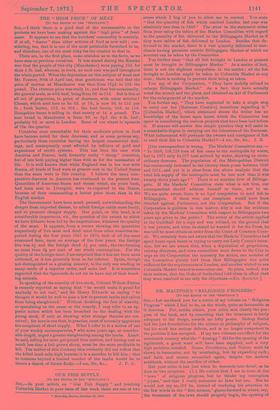THE "HIGH PRICE" OF MEAT.
[TO THIS EDITOR OF THR SPZOTATOR.1
SIR,—I think there is a good deal of the unreasonable in the protests we have been making against the "high price" of fresh meat. It appears to me that the butchers' commodity is scarcely, if at all, "dearer" than other articles of food as now sold ; con- sidering, too, that it is one of the most perishable furnished to us, and therefore, one of the most risky for the retailer to deal in.
There are, in the first place, some mistakes as to the facts, as we have seen on previous occasions. It was stated during the Russian war that the people of this city (Manchester) were paying 10d. for their 4-lb. loaf, whereas, in truth, no such sum was paid throughout the whole period. When the deputation on this subject of meat saw Mr. Forster, 30th of April last, that gentleman was told that the price of mutton at Manchester was then from 121d. to 13d. the pound. The extreme price was really la., and that but occasionally, the general scale, as with beef, being from 8d. to 11d. But is this at all out of proportion, in point of dearness, with other articles? Cheese, which used here to be 6d. or 7d., is now 9d. to 11d, per lb. ; fresh butter, 17d. to 20d.; the beat bacon, 10d. to 11d. Hampshire bacon is selling in that county at la a pound. The best bread in Manchester is from 8d. to 80. the 4-lb. loaf ; probably 9d. or more in London. Some of our wheat is upwards of 70s. the quarter.
Countries once remarkable for their moderate prices in food have become noted for their dearness, and as some persons say, particularly those countries having the largest commercial deal- ings, and consequently most affected by influxes of gold and expansions of credit systems. This has been the case with America and France, both formerly really " cheap " countries, but of late both paying higher than with us for the necessaries of life. It is well known that while England was in her war with Russia, all kinds of food were at greater cost in the United States than the same were in this country. I believe the same com- parative dearness in America has continued to the present time. Quantities of American bacon and cheese which, six years back, had been sent to Liverpool, were re-exported to the States, because of their commanding a better price there than in the English market.
The Government have been much pressed, notwithstanding the danger from imported disease, to admit foreign cattle more freely, and so promote cheaper supply. One point, on this head, is of considerable importance, viz., the question of the extent to which we have hitherto been fed by the importations, whatever the quality of the meat. It appears, from a return showing the quantities respectively of live meat and dead meat from other countries im- ported during the four years 1867 to 1870, that of all the meat consumed here, upon an average of the four years, the foreign live was 4-1 and the foreign dead 4} per cent., the two forming no more than 84. per cent. of our whole consumption. For the quality of the foreign meat, lam surprised that it has not been more criticised, as it has generally been so far inferior. Spain, though not distinguished as a grazing country, is the only one sending us many cattle of a superior order, and none bad. It is sometimes regretted that the Spaniards do not let us have any of their breed- ing animals.
In speaking of the scarcity of live-stock, Colonel Wilson-Patten is recently reported as saying that "he would make it penal for anybody to eat veal," and Sir Henry Edwards as saying "he thought it would be well to pass a law to prevent lambs and calves from being slaughtered." Without doubting the fact of scarcity, or speculating on the cause or the remedy, I may refer to an op- posite notion which has been broached on the dealing with the young stock, if only as showing what strange theories are con- ceived; for here is one that, in practice, must of necessity aggravate the complaint of short supply. What I refer to is a notion of one of your weekly contemporaries,* who some years ago, at consider- able length, urged a greater slaughtering among the lambs. Lamb, he said, Belling for more per pound than mutton, and having cost so much leas than a full-grown sheep, must be the more profitable to kill. The author of this Cockney idea evidently did not reflect that the killed lamb sells high because it is a sacrifice to kill him ; that to consume beyond a limited number of the lambs would be to
insure a dearth of future flocks.—I am, Sir, &c., J. P. C.


































 Previous page
Previous page